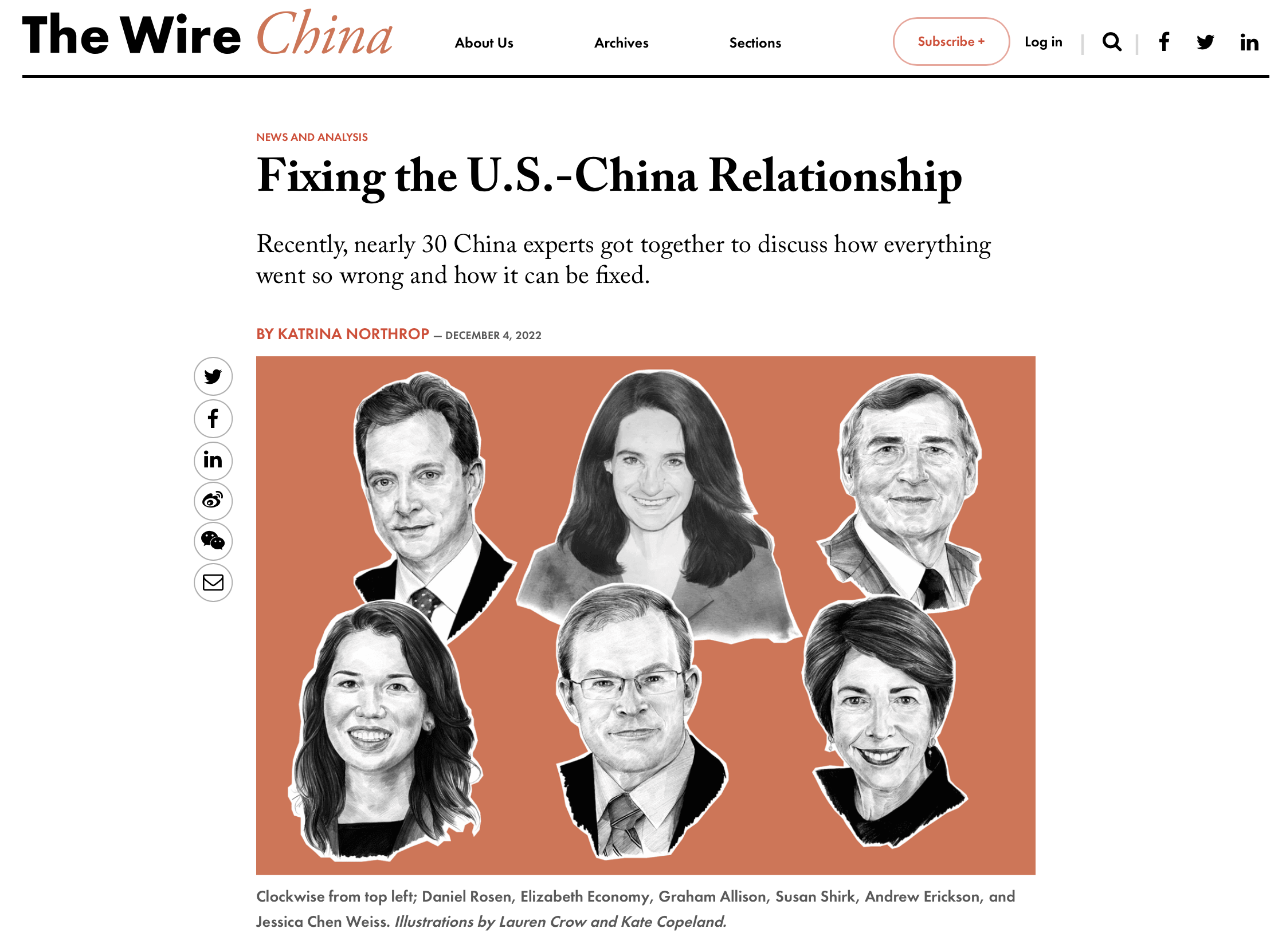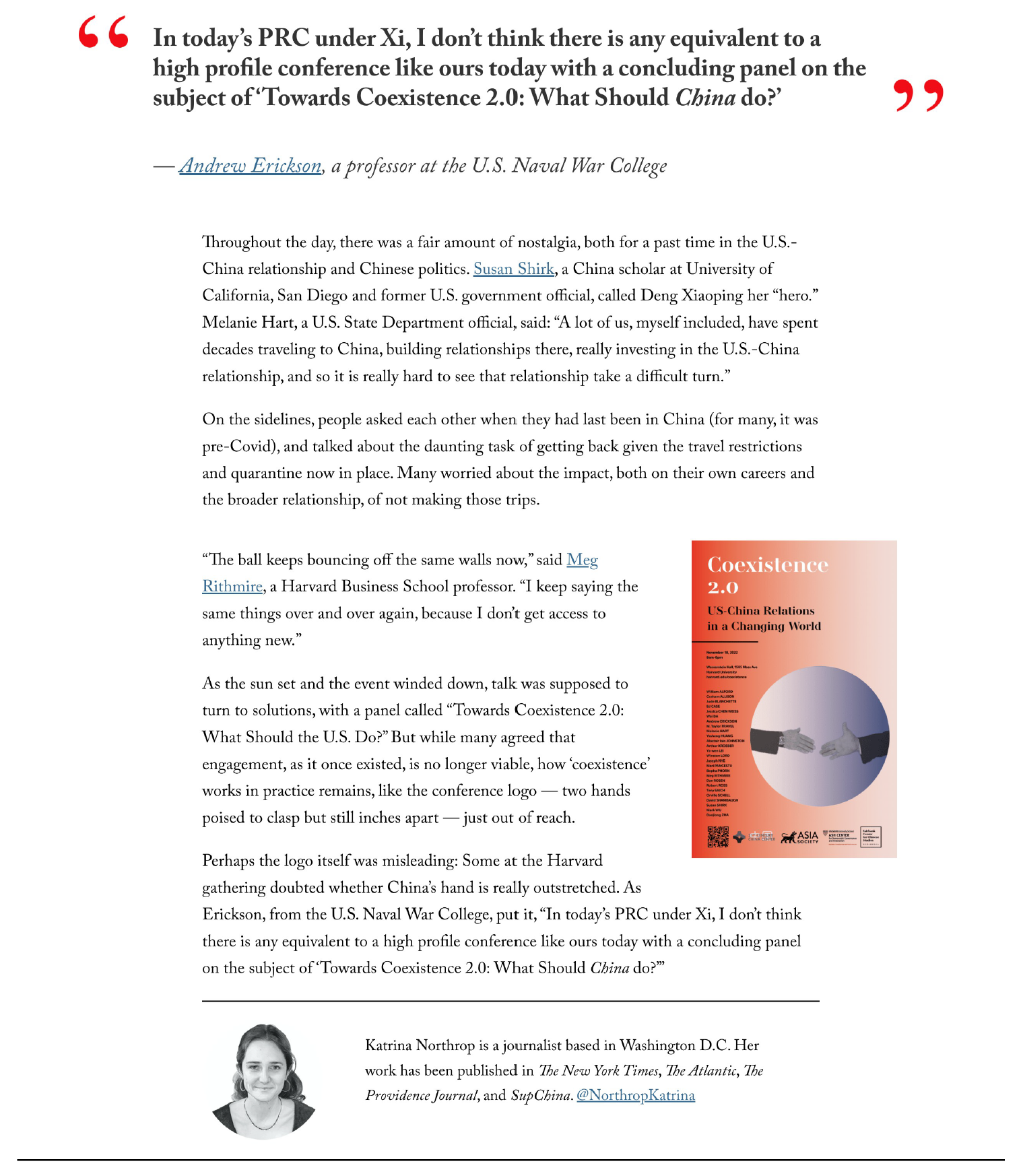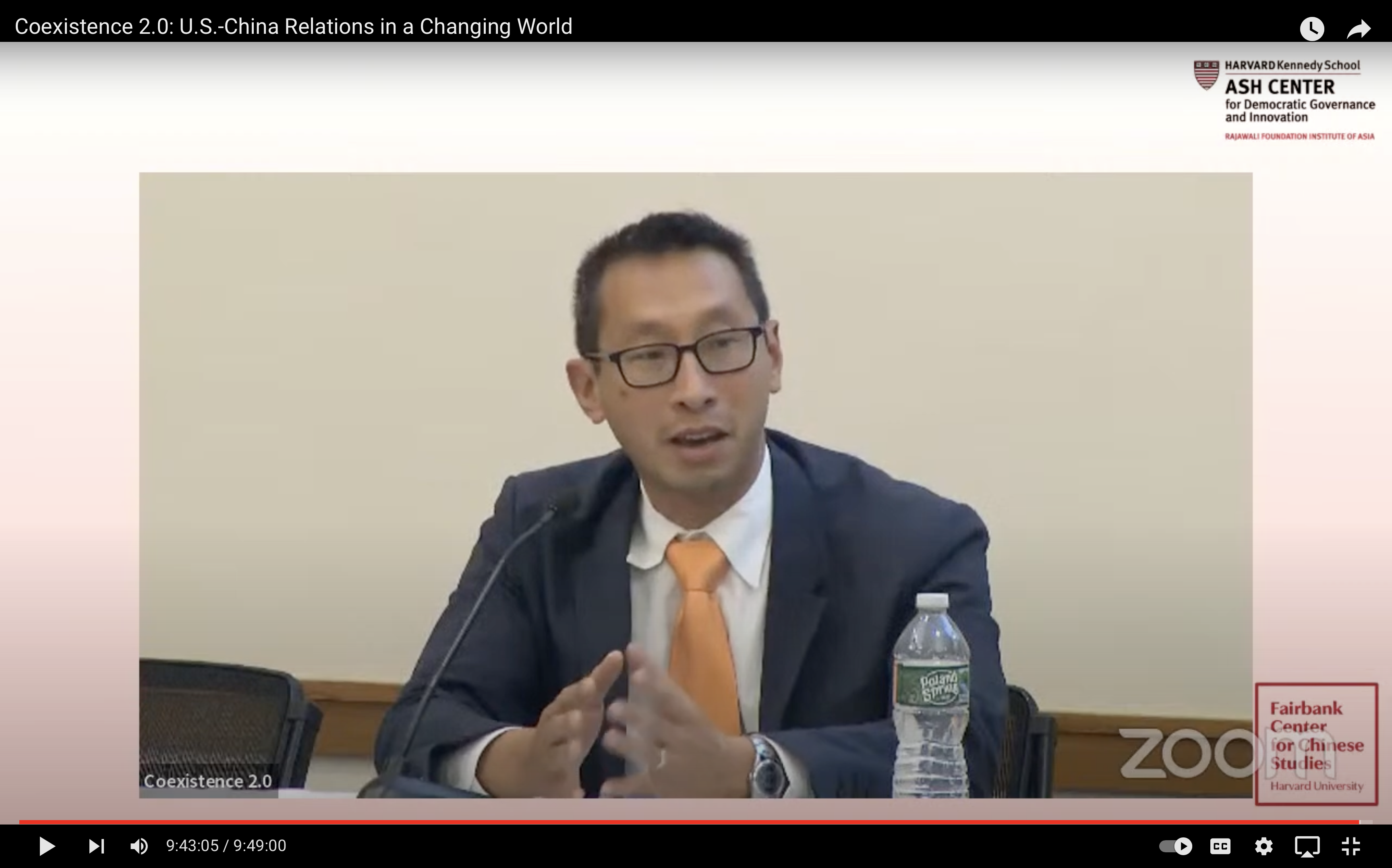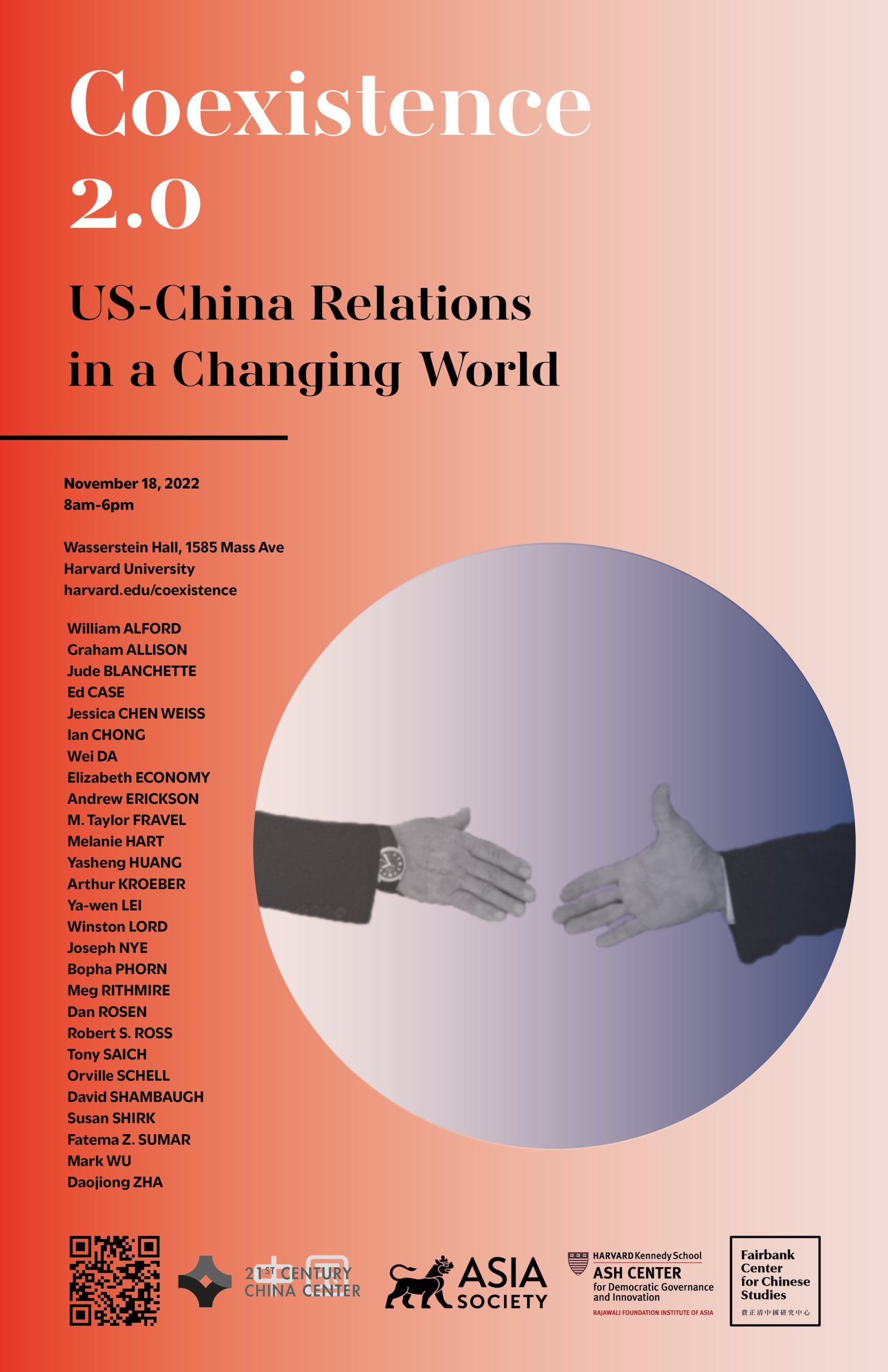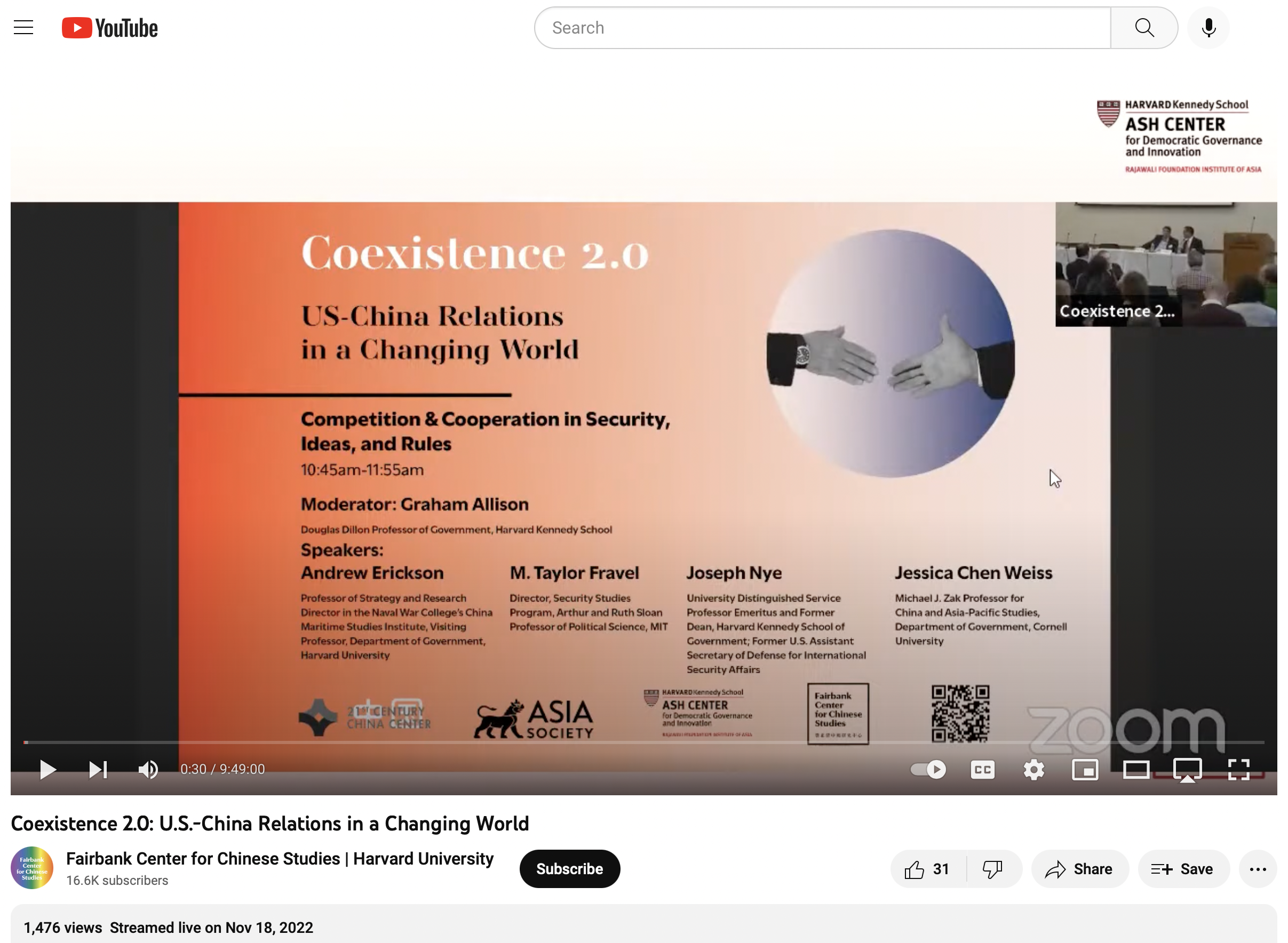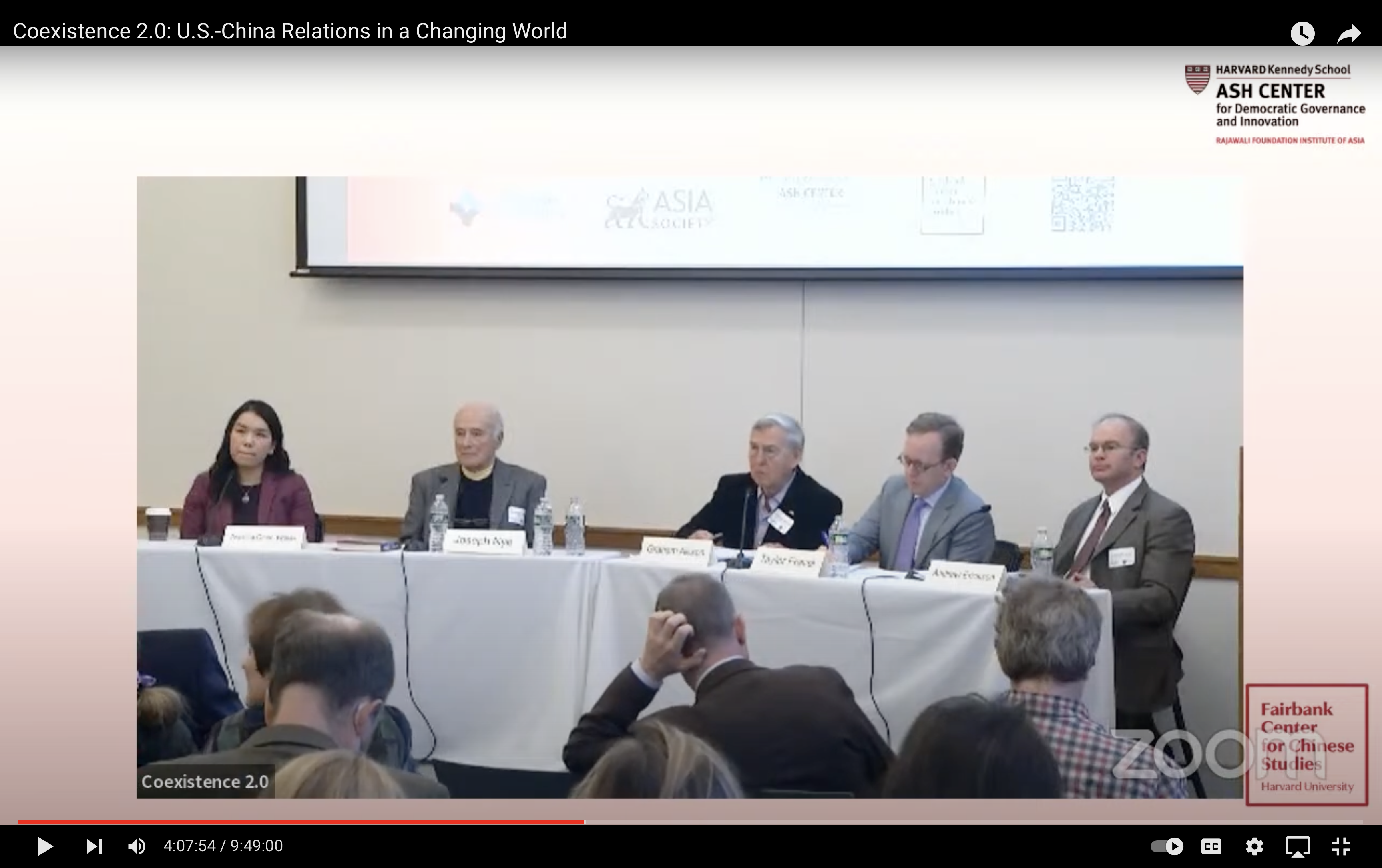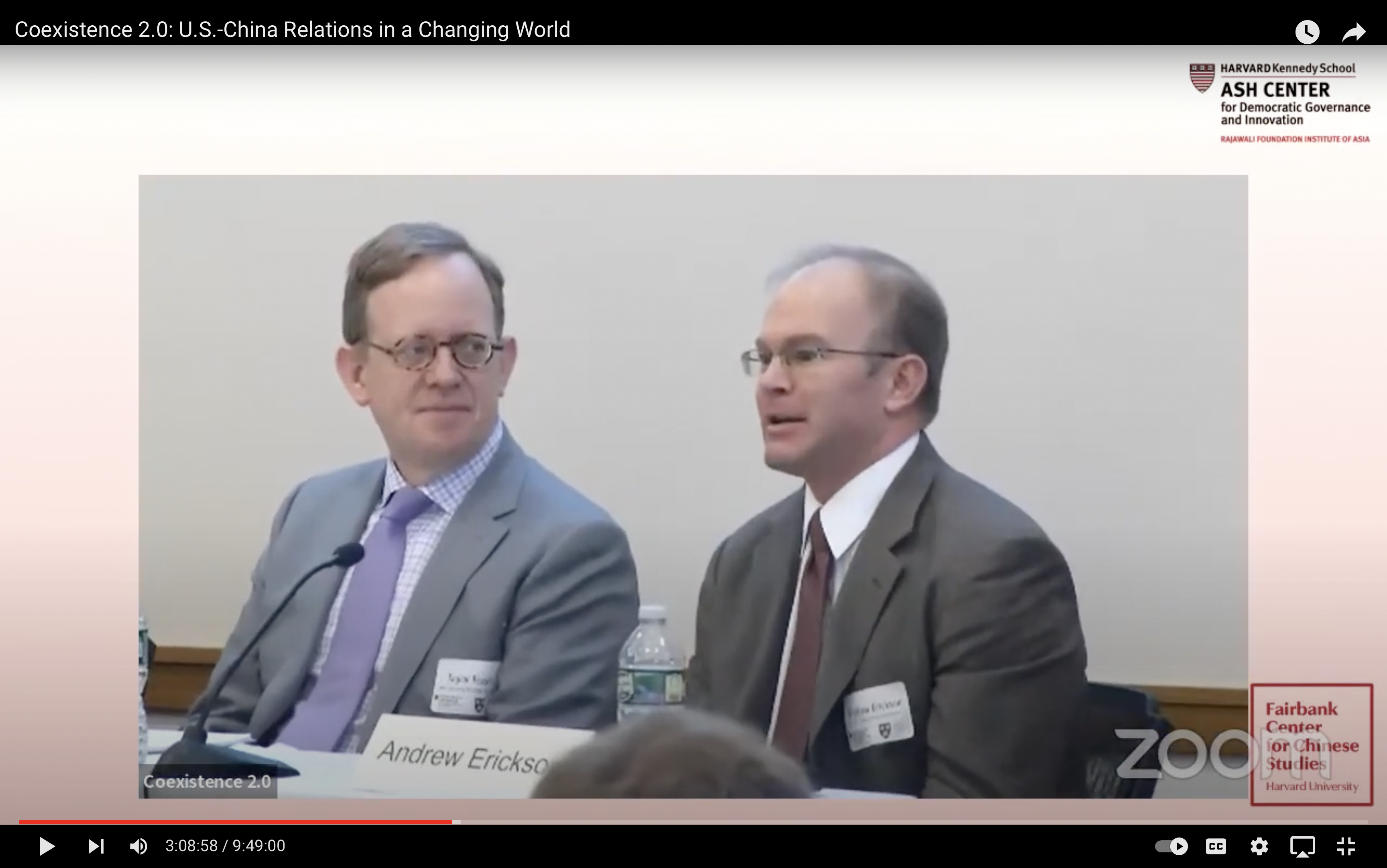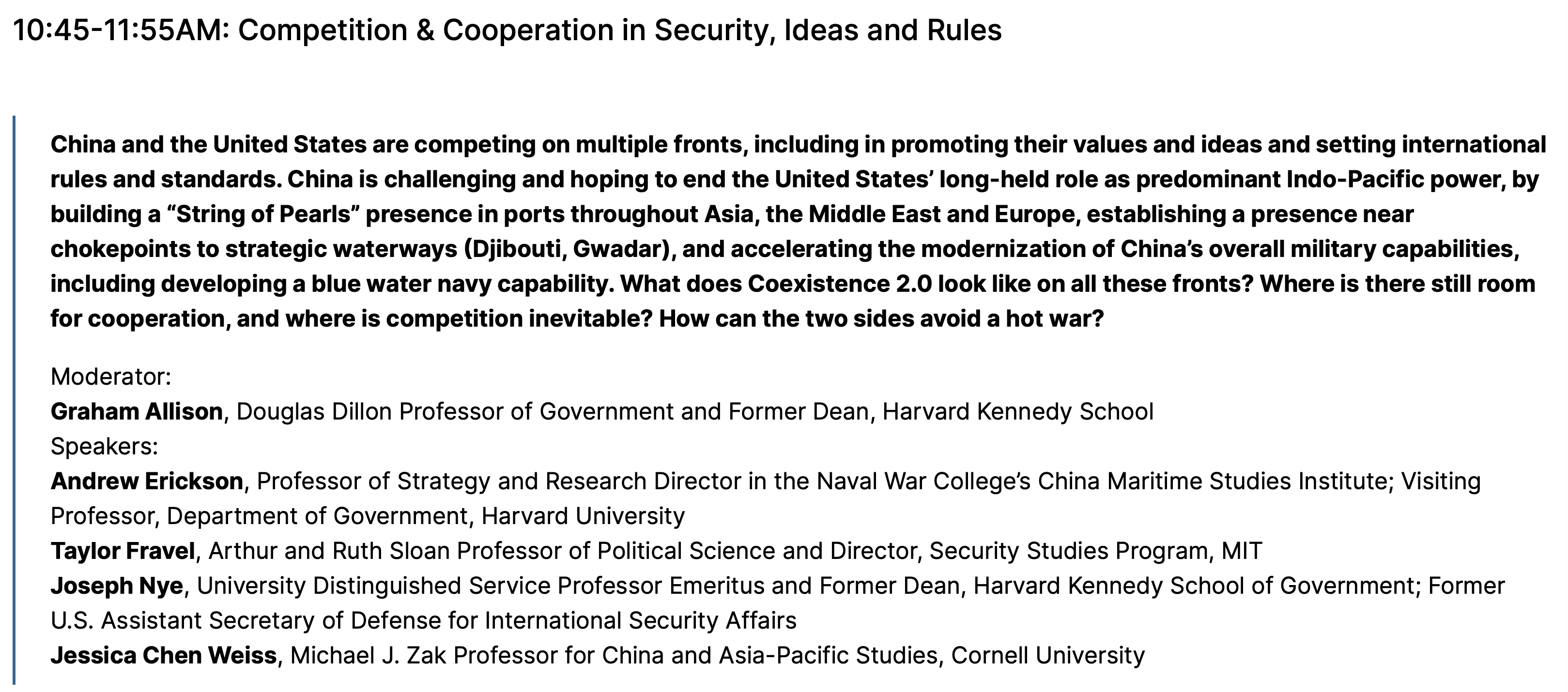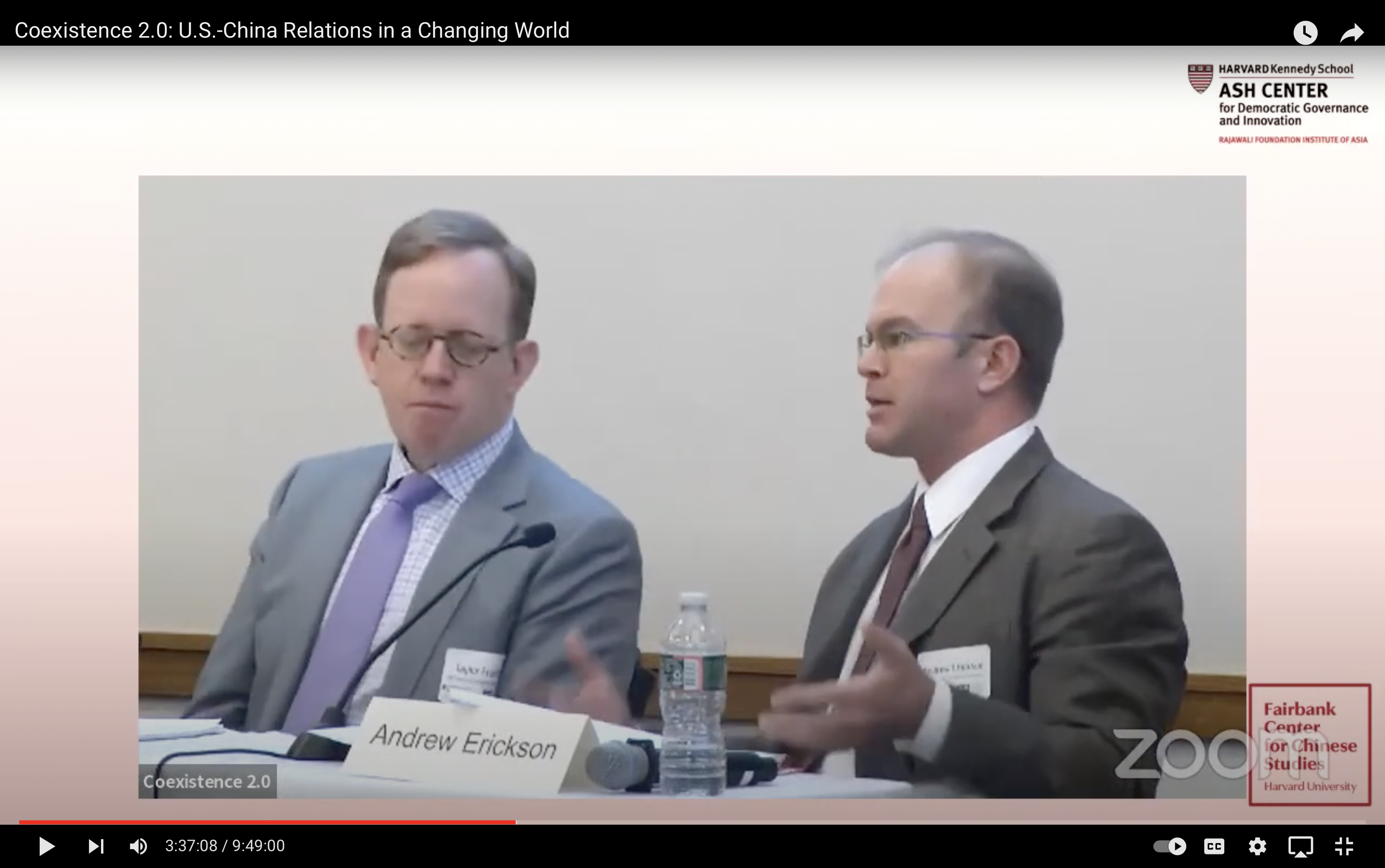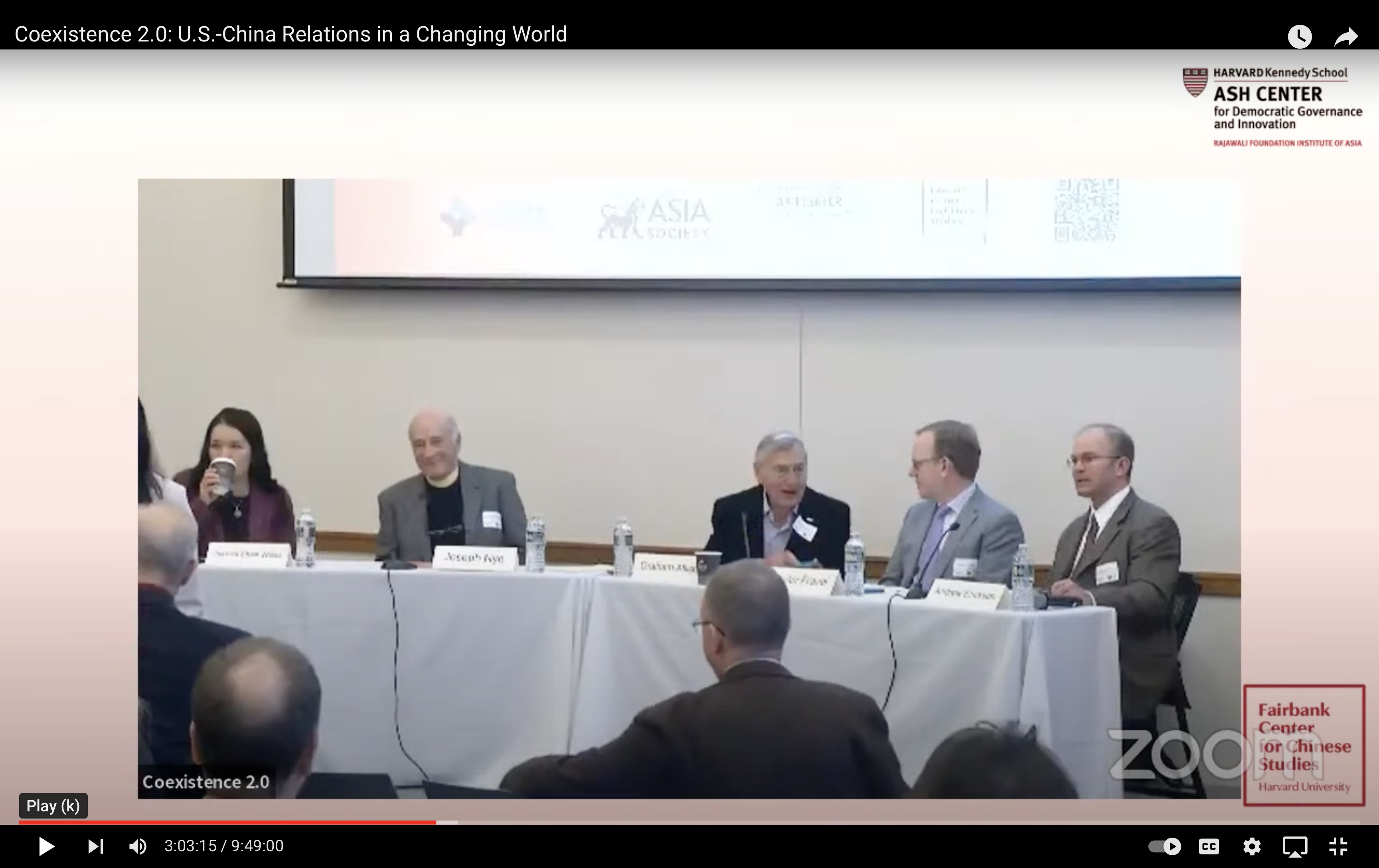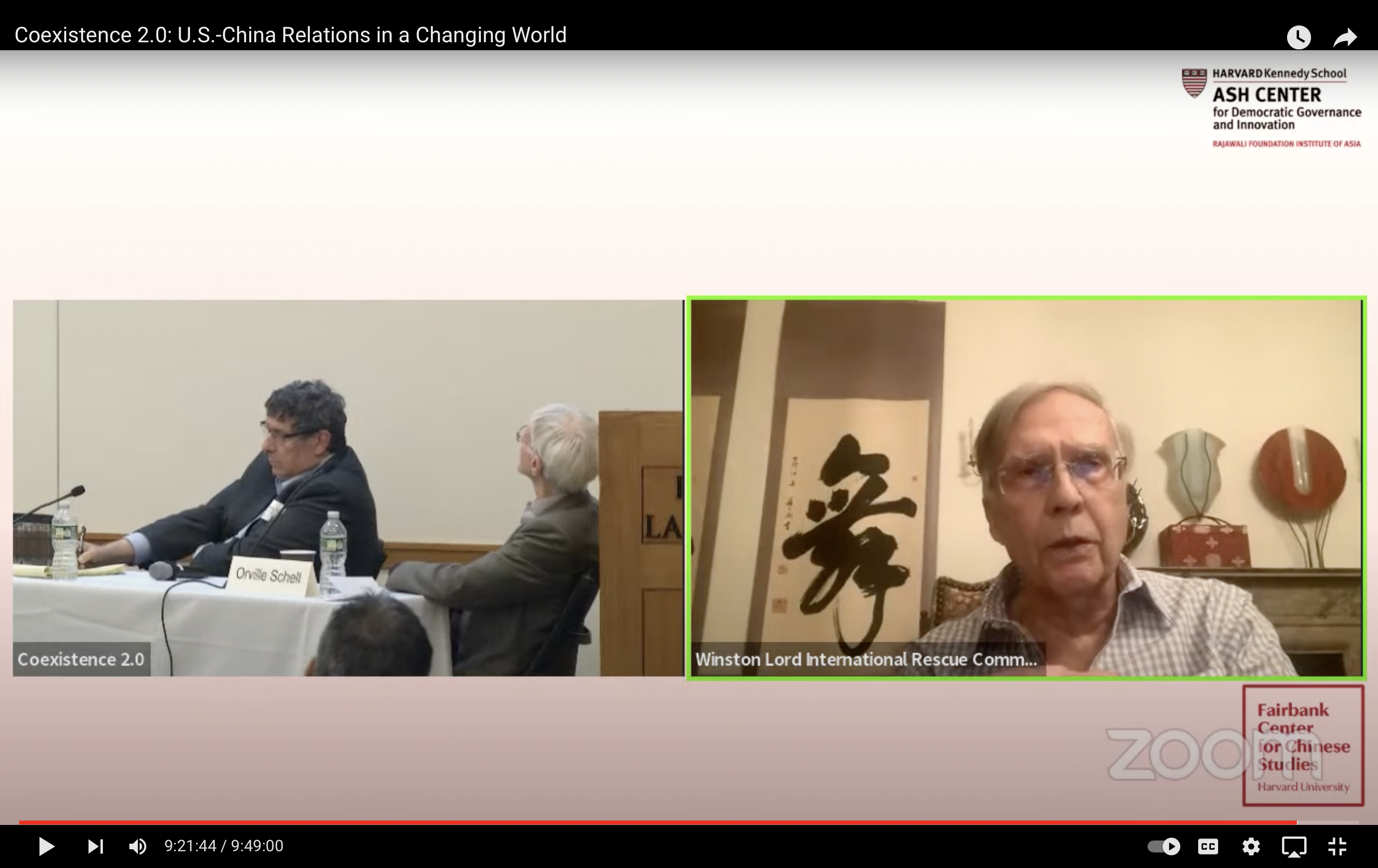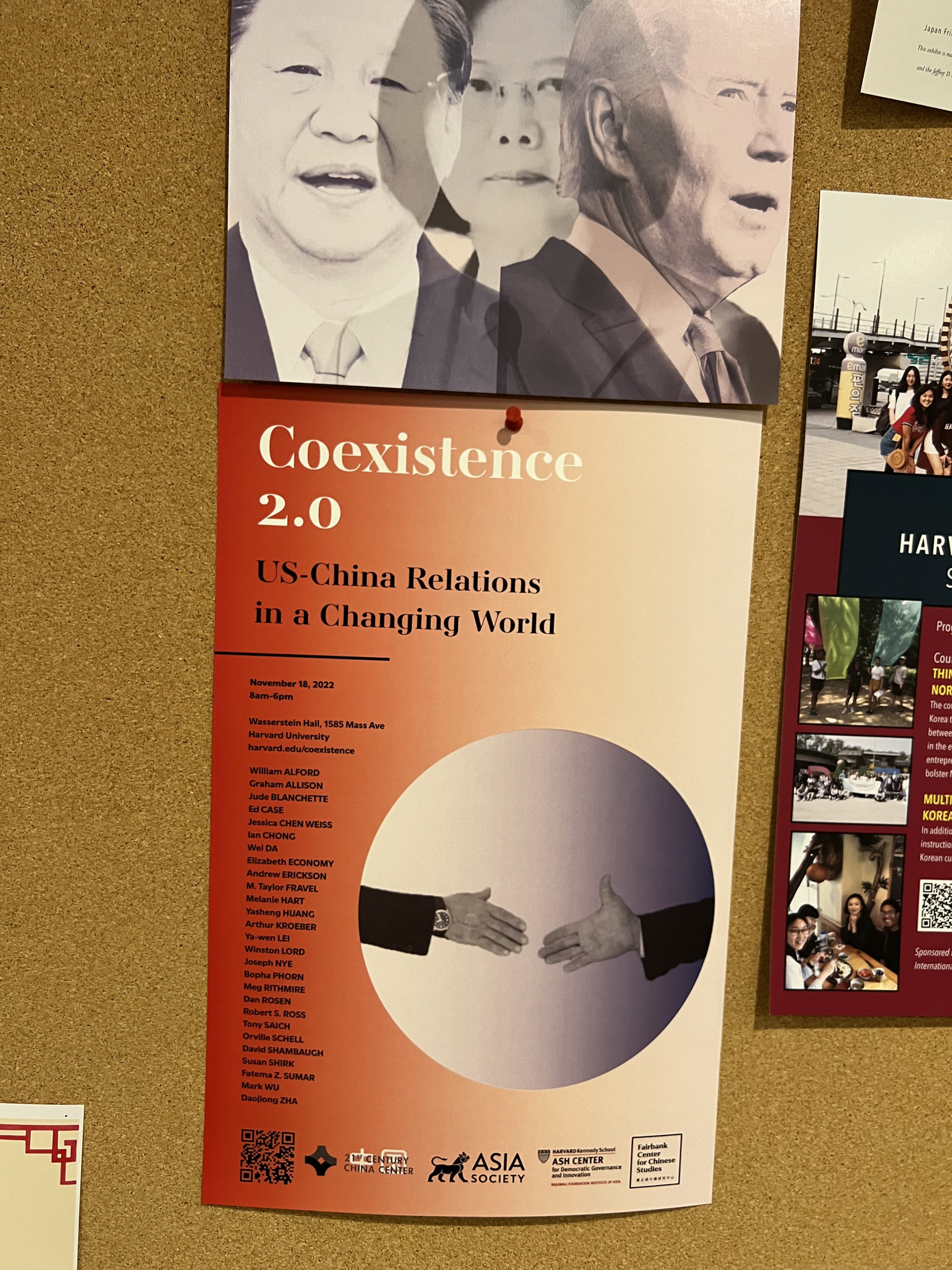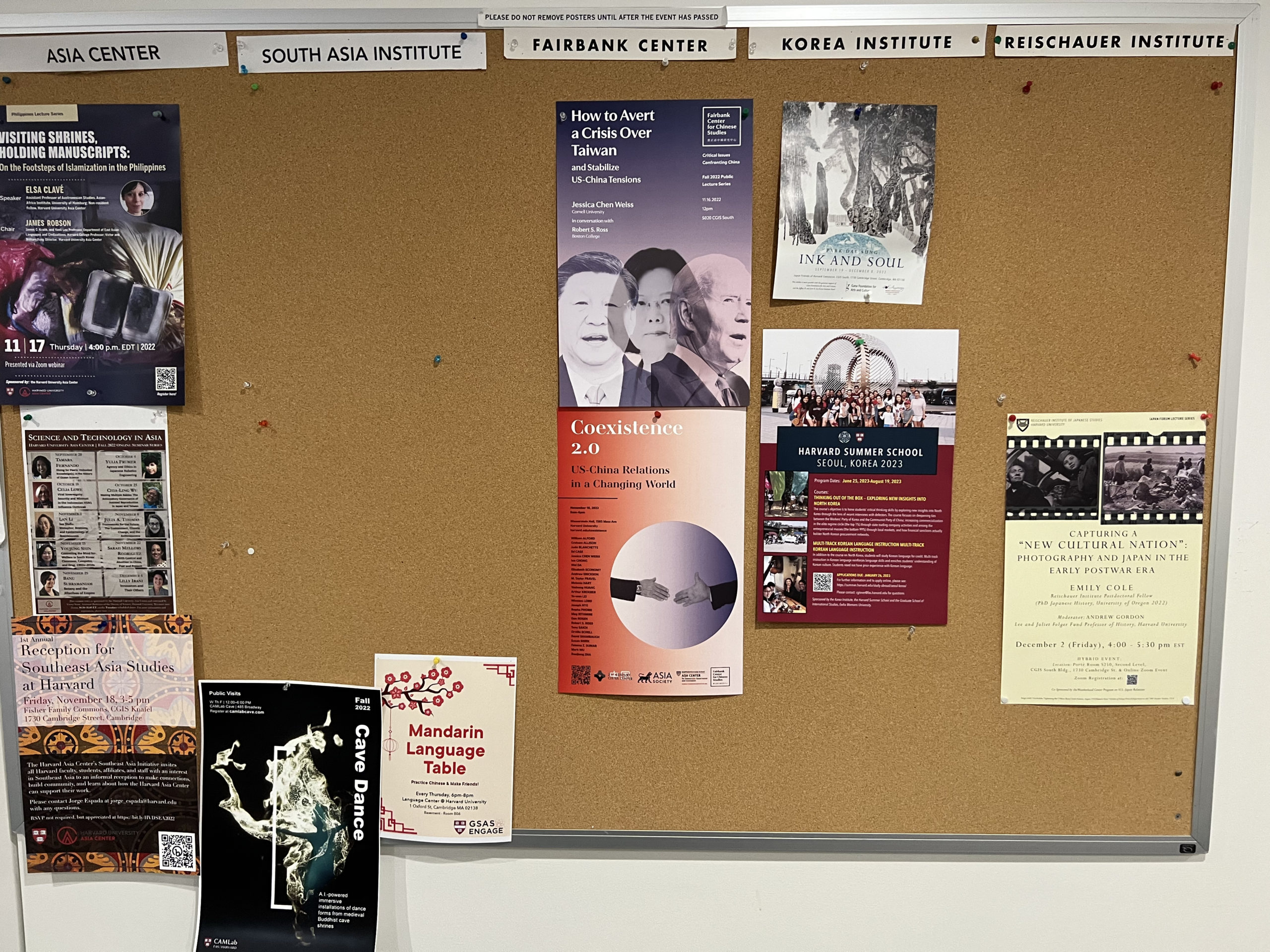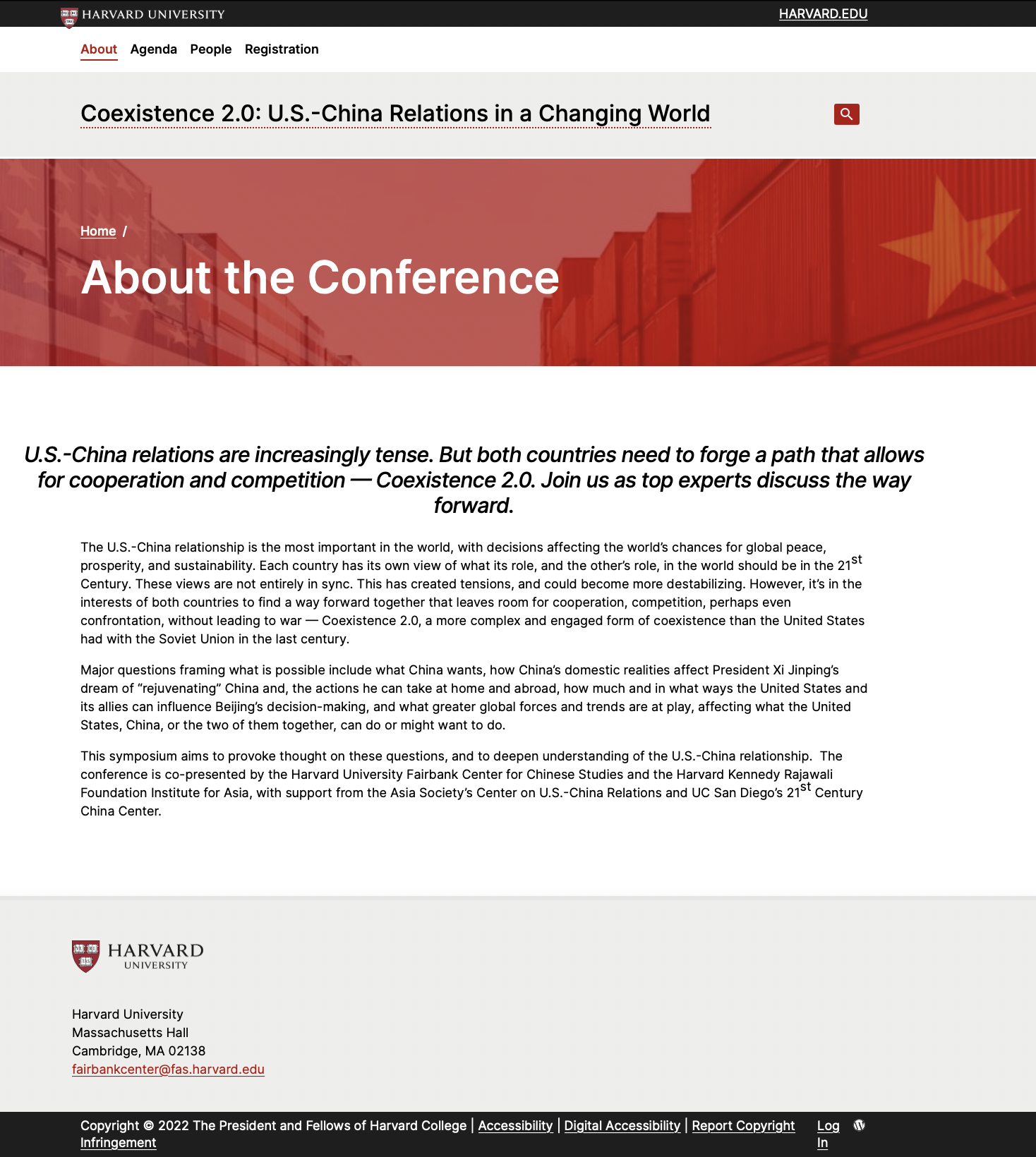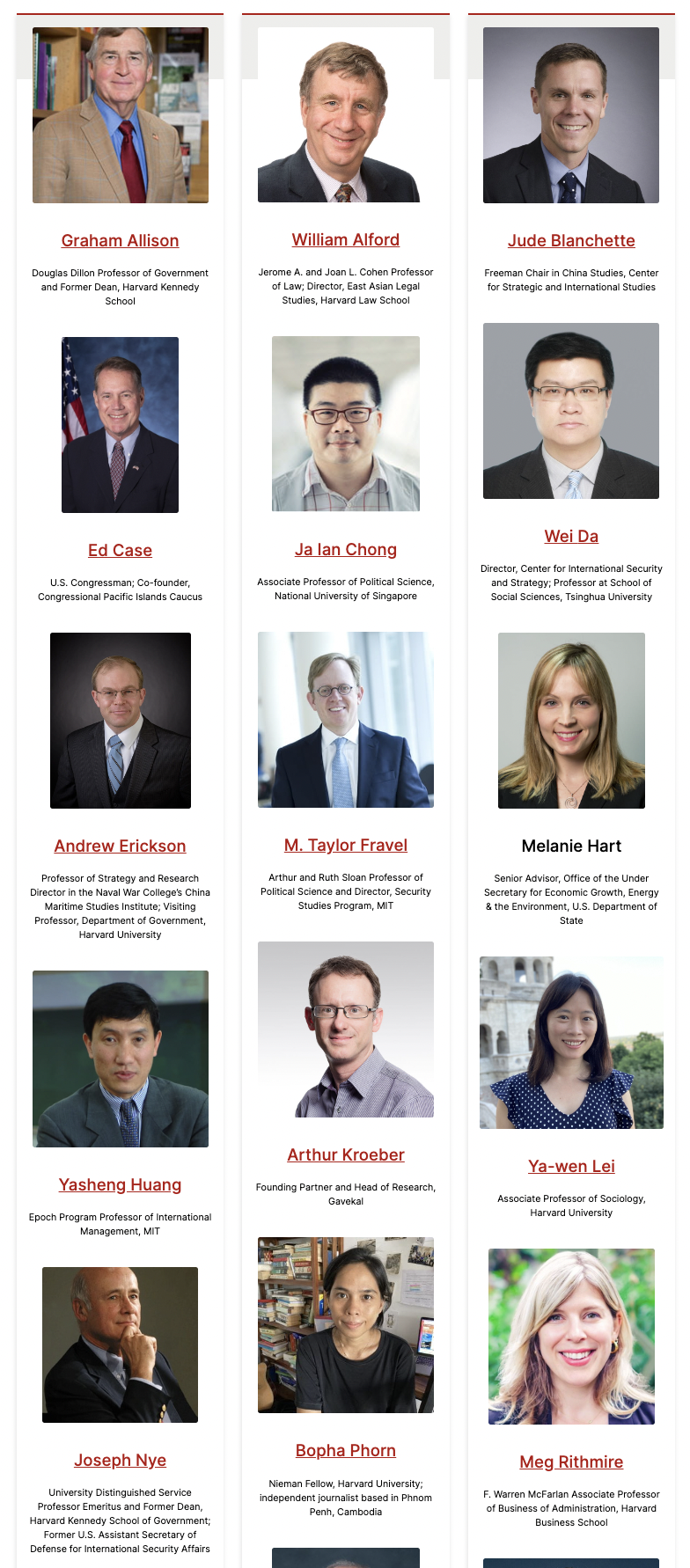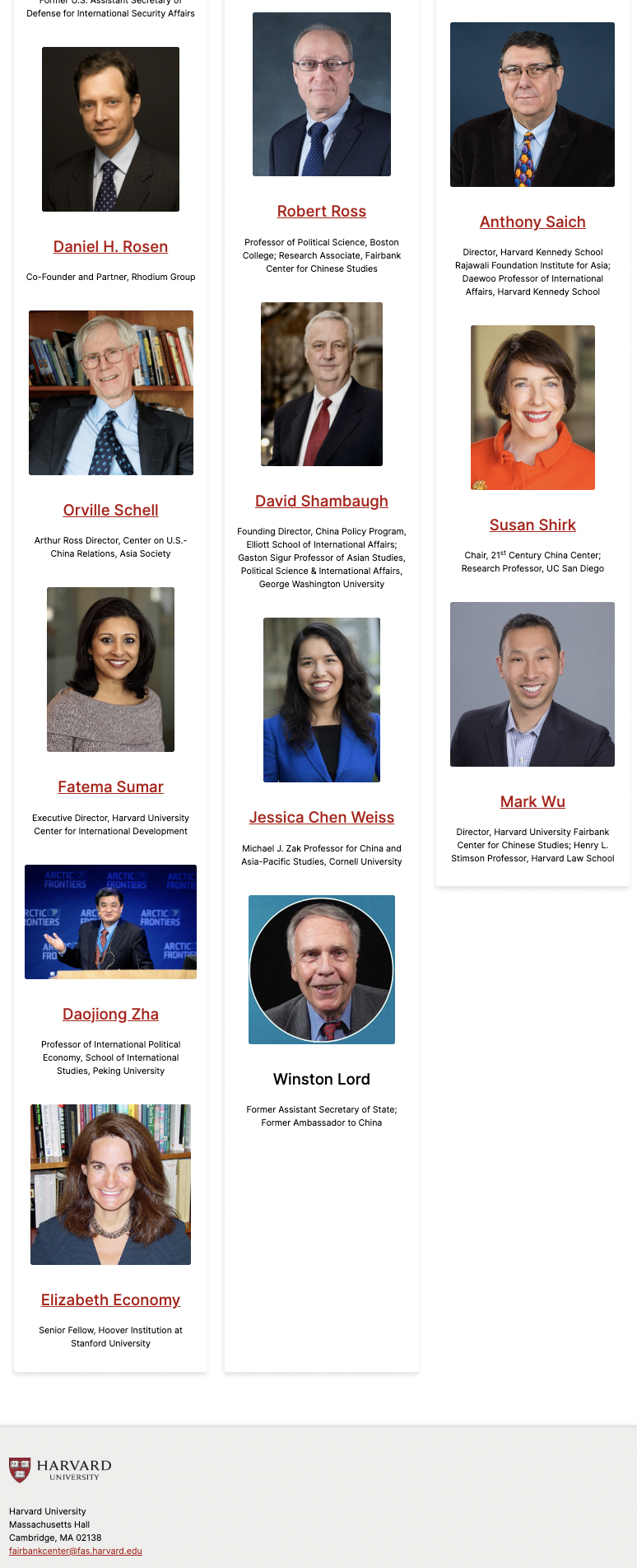Harvard Conference on U.S.-China Relations—18 November 2022—Covered in “The Wire China”
I was honored to join many China scholars and others at a recent event in Cambridge, MA:
“Coexistence 2.0: U.S.-China Relations in a Changing World” Conference. Co-presented by the Harvard University Fairbank Center for Chinese Studies and the Harvard Kennedy Rajawali Foundation Institute for Asia, with support from the Asia Society’s Center on U.S.-China Relations and UC San Diego’s 21st Century China Center, Wasserstein Hall, Harvard Law School, 18 November 2022.
Now Katrina Northrop has published an account in The Wire China. I believe this all-day marathon of pertinent panels generated much useful discussion, and I hope that it can continue to do so more broadly.
Katrina Northrop, “Fixing the U.S.-China Relationship,” The Wire China, 4 December 2022.
Recently, nearly 30 China experts got together to discuss how everything went so wrong and how it can be fixed.
Clockwise from top left; Daniel Rosen, Elizabeth Economy, Graham Allison, Susan Shirk, Andrew Erickson, and Jessica Chen Weiss. Illustrations by Lauren Crow and Kate Copeland.
On a cold Friday morning in late November, a group of nearly 30 academics, officials, and analysts — each of whom had spent their entire career working on the U.S.-China relationship — gathered in a nondescript conference room on the campus of Harvard University to discuss two big questions: how did everything go so wrong and how can it be fixed? … … …
During one panel, Graham Allison, the former dean of Harvard Kennedy School of Government and whose book Destined for War predicts conflict between the world’s two largest economies, asked members of his panel whether they believed China wanted to be the foremost power in Asia (all four said yes). Allison’s follow-up question — inspired by a recent piece by one of the panelists, the Cornell scholar Jessica Chen Weiss — asked whether U.S. policy has become so caught up in competing with China that it fails to put forward an affirmative view (three largely agreed, one disagreed). The lone dissenter, Andrew Erickson, who teaches at the U.S. Naval War College, acknowledged it was a “sad state of affairs” but said he sees no real basis for cooperation between the two nations. … … …
Honored to present on “Panel 4: Competition & Cooperation in Security, Ideas and Rules,” at “Coexistence 2.0: U.S.-China Relations in a Changing World” Conference.
- Co-presented by the Harvard University Fairbank Center for Chinese Studies and the Harvard Kennedy Rajawali Foundation Institute for Asia, with support from the Asia Society’s Center on U.S.-China Relations and UC San Diego’s 21st Century China Center.
- Hosted at Milstein Conference Center, Wasserstein Hall, Harvard Law School, 18 November 2022.
- Click here to watch entire event on YouTube.
Panel on “Competition & Cooperation in Security, Ideas and Rules” begins at 3:03:58.
The Milstein Conference Center
Wasserstein Hall, Harvard Law School
8:00-8:10AM: Welcome
Mark Wu, Director, Harvard University Fairbank Center for Chinese Studies; Henry L. Stimson Professor, Harvard Law School
Tony Saich, Director, Harvard Kennedy School Rajawali Foundation Institute for Asia; Daewoo Professor of International Affairs, Harvard Kennedy School
8:10 – 9:10AM: Chinese Views on U.S.-China Relations
Two influential Chinese experts share their views of changing U.S.-China relations, in conversation with the moderator.
Moderator:
Yasheng Huang, Epoch Foundation Professor of International Management, MIT
Speakers:
Wei Da, Director, Center for International Security and Strategy; Professor at School of Social Sciences, Tsinghua University
Daojiong Zha, Professor of International Political Economy, School of International Studies, Peking University
9:10-9:20AM: Break
9:20-10:30AM: China’s Realities at Home
What domestic realities and challenges are driving and affecting the Chinese government’s goals and strategy, at home and abroad, in terms of Communist Party politics, the state of China’s economy, and social factors?
Moderator:
Tony Saich, Director, Harvard Kennedy School Rajawali Foundation Institute for Asia; Daewoo Professor of International Affairs
Speakers:
Arthur Kroeber, Founding Partner, Head of Research, Gavekal
Ya-Wen Lei, Associate Professor of Sociology, Harvard University
David Shambaugh, Founding Director, China Policy Program, Elliott School of International Affairs; Gaston Sigur Professor of Asian Studies, Political Science & International Affairs, George Washington University
Susan Shirk, Chair, 21st Century China Center; Research Professor, UC San Diego
10:45-11:55AM: Competition & Cooperation in Security, Ideas and Rules
China and the United States are competing on multiple fronts, including in promoting their values and ideas and setting international rules and standards. China is challenging and hoping to end the United States’ long-held role as predominant Indo-Pacific power, by building a “String of Pearls” presence in ports throughout Asia, the Middle East and Europe, establishing a presence near chokepoints to strategic waterways (Djibouti, Gwadar), and accelerating the modernization of China’s overall military capabilities, including developing a blue water navy capability. What does Coexistence 2.0 look like on all these fronts? Where is there still room for cooperation, and where is competition inevitable? How can the two sides avoid a hot war?
Moderator:
Graham Allison, Douglas Dillon Professor of Government and Former Dean, Harvard Kennedy School
Speakers:
Andrew Erickson, Professor of Strategy and Research Director in the Naval War College’s China Maritime Studies Institute; Visiting Professor, Department of Government, Harvard University
Taylor Fravel, Arthur and Ruth Sloan Professor of Political Science and Director, Security Studies Program, MIT
Joseph Nye, University Distinguished Service Professor Emeritus and Former Dean, Harvard Kennedy School of Government; Former U.S. Assistant Secretary of Defense for International Security Affairs
Jessica Chen Weiss, Michael J. Zak Professor for China and Asia-Pacific Studies, Cornell University
12:00-1:15PM: Lunch (on your own)
1:15-2:25PM: Competition & Cooperation in Trade, Investment, and Technology
A look at U.S.-China competition in global trade and investment, especially emergent technologies and infrastructure. To what extent should both sides engage in greater decoupling for national security reasons? What do developing nations want, how has China’s BRI changed the landscape, and how effectively are the United States and its allies responding? Even amid growing strategic competition, can both parties work to define common norms of behavior in cyberspace and to cooperate on emergent technologies to address common problems?
Moderator:
Mark Wu, Director, Harvard University Fairbank Center for Chinese Studies, Henry L. Stimson Professor, Harvard Law School
Speakers:
Elizabeth Economy, Senior Fellow, Hoover Institution at Stanford University
Meg Rithmire, F. Warren McFarlan Associate Professor of Business of Administration, Harvard Business School
Dan Rosen, Co-Founder and Partner, Rhodium Group
2:25-2:35PM: Break
2:35-3:45PM: How Asian Countries See China and U.S.-China Competition
Much of Asia is stuck in the middle between longstanding relationships with the United States and the prospect of potential economic opportunity coming from China. How do Asian countries view China’s rise—as a threat or an economic opportunity? Are they fearful of falling into the “debt trap” that international analysts have warned of, or do they welcome Chinese investment? How are they affected by U.S. trade sanctions on China? What do they hope the United States will offer?
Moderator:
Fatema Z. Sumar, Executive Director, Harvard University Center for International Development
Speakers:
Ian Chong, Associate Professor of Political Science, National University of Singapore
Bopha Phorn, Nieman Fellow, Harvard University; independent journalist based in Phnom Penh, Cambodia
Ed Case, U.S. Congressman; Co-founder, Congressional Pacific Islands Caucus
3:45-4:00PM: Break
4:00-5:10PM: Toward Coexistence 2.0: What Should the U.S. Do?
If Coexistence 2.0 is to allow healthy competition and even some cooperation while avoiding unnecessary war, what needs to happen to get there, recognizing that China aspires to greater global influence than it already has? How can these two great powers collaborate more on global issues that matter, like climate change? What is U.S. policy already doing well to support U.S. interests and the rules-based international order? What could U.S. policy do better? Can the Thucydides trap be avoided, and how much do both sides really want to avoid it?
Moderator:
William Alford, Jerome A. and Joan L. Cohen Professor of Law; Director, East Asian Legal Studies, Harvard Law Schools
Speakers:
Jude Blanchette, Freeman Chair in China Studies, Center for Strategic and International Studies
Melanie Hart, Senior Advisor, Office of the Under Secretary for Economic Growth, Energy & the Environment, U.S. Department of State
Orville Schell, Arthur Ross Director, Center on U.S.-China Relations, Asia Society
Robert S. Ross, Professor of Political Science, Boston College; Research Associate, Fairbank Center for Chinese Studies
5:10-5:50PM: What Does History Tell Us?
Winston Lord accompanied Henry Kissinger on his secret trip to China in 1971, and he has been helping to shape U.S. policy and watching China closely ever since. Lord served as ambassador to China from 1985-1989, tumultuous years that saw the country’s rapid opening up and then the crackdown on the 1989 democracy movement. He served as Assistant Secretary of State from 1993–1997.
Ambassador Winston Lord, Former Assistant Secretary of State; Former Ambassador to China
In conversation with Orville Schell, Arthur Ross Director, Center on U.S.-China Relations, Asia Society
5:50-6:00PM: Closing Remarks
Mark Wu, Director, Director, Harvard University Fairbank Center for Chinese Studies; Henry L. Stimson Professor, Harvard Law School
Tony Saich, Harvard Kennedy School Rajawali Foundation Institute for Asia; Daewoo Professor of International Affairs, Harvard Kennedy School
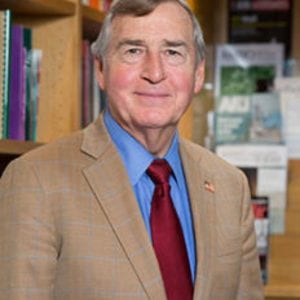
Graham Allison
Douglas Dillon Professor of Government and Former Dean, Harvard Kennedy School
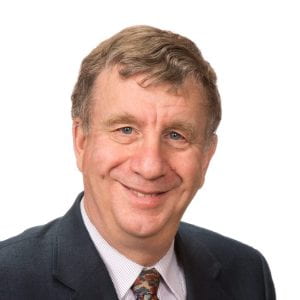
William Alford
Jerome A. and Joan L. Cohen Professor of Law; Director, East Asian Legal Studies, Harvard Law School
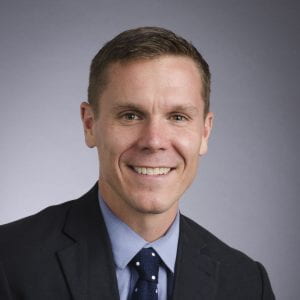
Jude Blanchette
Freeman Chair in China Studies, Center for Strategic and International Studies
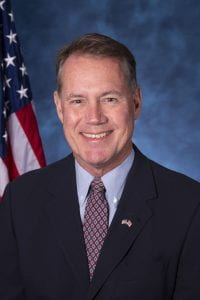
Ed Case
U.S. Congressman; Co-founder, Congressional Pacific Islands Caucus
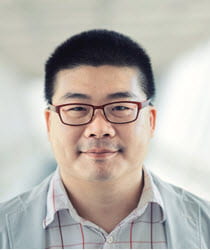
Ja Ian Chong
Associate Professor of Political Science, National University of Singapore
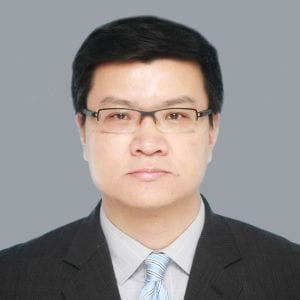
Wei Da
Director, Center for International Security and Strategy; Professor at School of Social Sciences, Tsinghua University

Elizabeth Economy
Senior Fellow, Hoover Institution at Stanford University
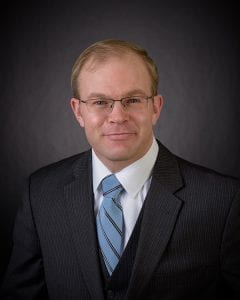
Andrew Erickson
Professor of Strategy and Research Director in the Naval War College’s China Maritime Studies Institute; Visiting Professor, Department of Government, Harvard University

M. Taylor Fravel
Arthur and Ruth Sloan Professor of Political Science and Director, Security Studies Program, MIT
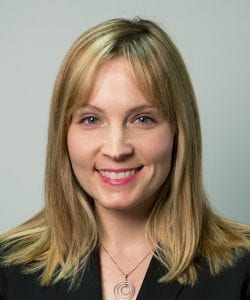
Melanie Hart
Senior Advisor, Office of the Under Secretary for Economic Growth, Energy & the Environment, U.S. Department of State
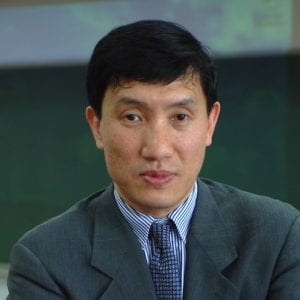
Yasheng Huang
Epoch Program Professor of International Management, MIT

Arthur Kroeber
Founding Partner and Head of Research, Gavekal
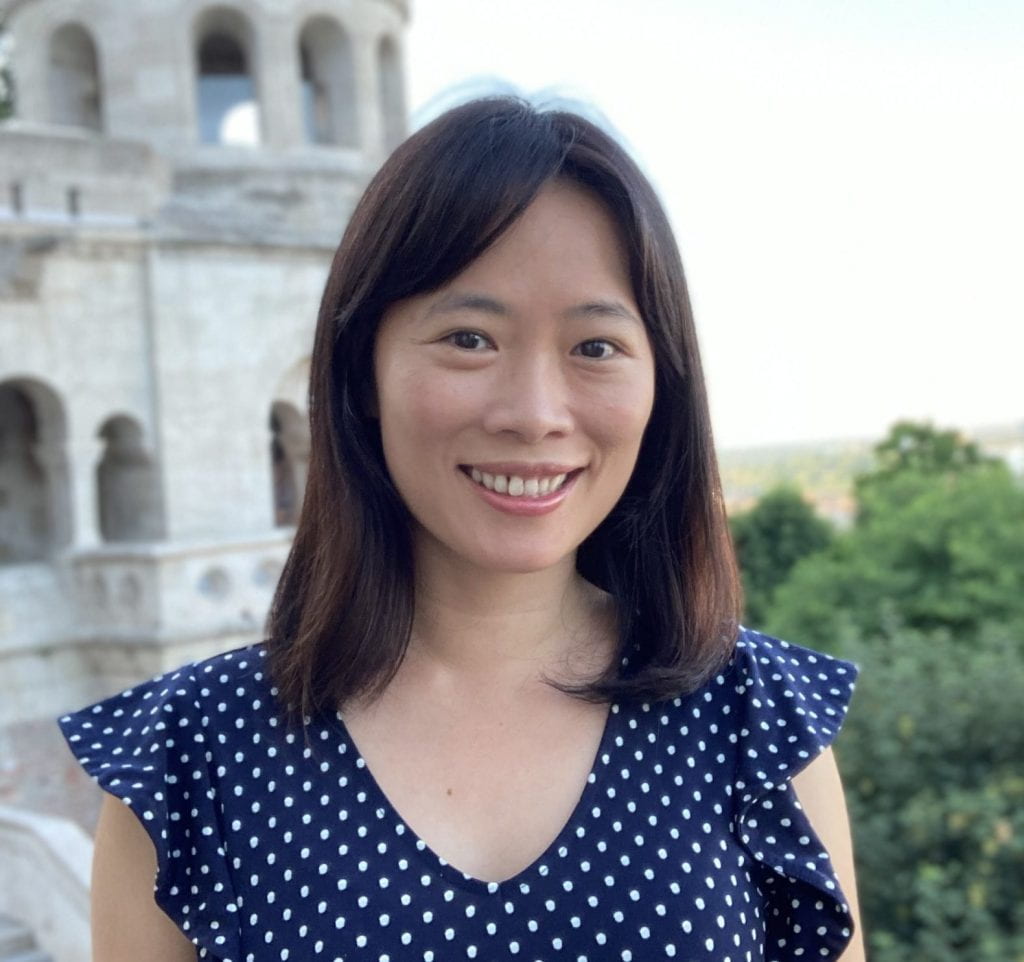
Ya-wen Lei
Associate Professor of Sociology, Harvard University
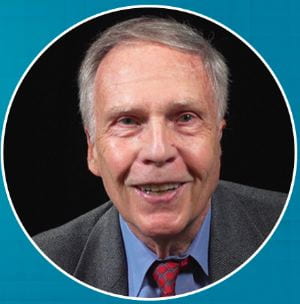
Winston Lord
Former Assistant Secretary of State; Former Ambassador to China

Joseph Nye
University Distinguished Service Professor Emeritus and Former Dean, Harvard Kennedy School of Government; Former U.S. Assistant Secretary of Defense for International Security Affairs
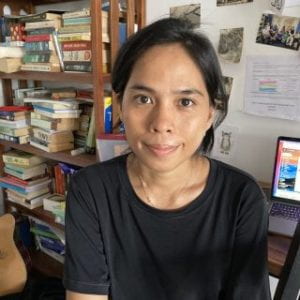
Bopha Phorn
Nieman Fellow, Harvard University; independent journalist based in Phnom Penh, Cambodia
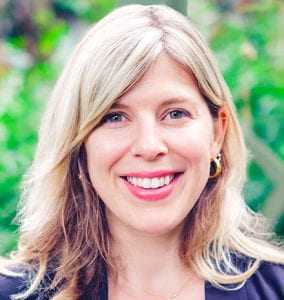
Meg Rithmire
F. Warren McFarlan Associate Professor of Business of Administration, Harvard Business School
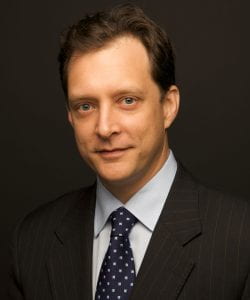
Daniel H. Rosen
Co-Founder and Partner, Rhodium Group

Robert Ross
Professor of Political Science, Boston College; Research Associate, Fairbank Center for Chinese Studies
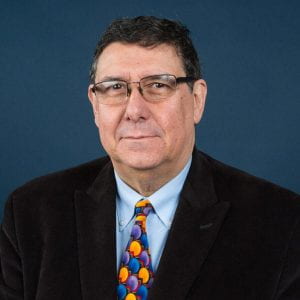
Anthony Saich
Director, Harvard Kennedy School Rajawali Foundation Institute for Asia; Daewoo Professor of International Affairs, Harvard Kennedy School
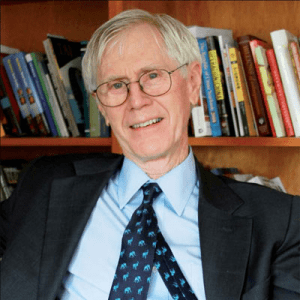
Orville Schell
Arthur Ross Director, Center on U.S.-China Relations, Asia Society
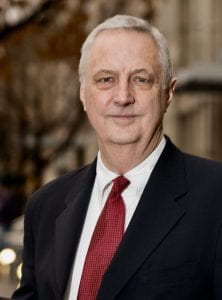
David Shambaugh
Founding Director, China Policy Program, Elliott School of International Affairs; Gaston Sigur Professor of Asian Studies, Political Science & International Affairs, George Washington University
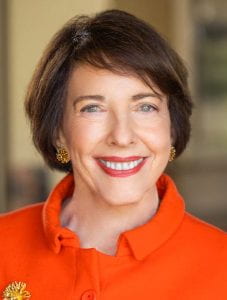
Susan Shirk
Chair, 21st Century China Center; Research Professor, UC San Diego
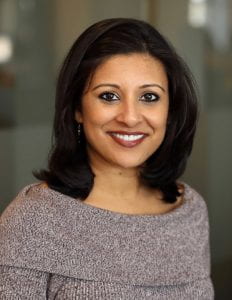
Fatema Sumar
Executive Director, Harvard University Center for International Development
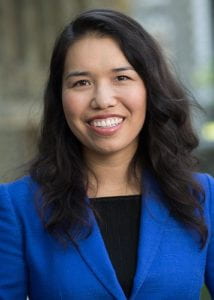
Jessica Chen Weiss
Michael J. Zak Professor for China and Asia-Pacific Studies, Cornell University
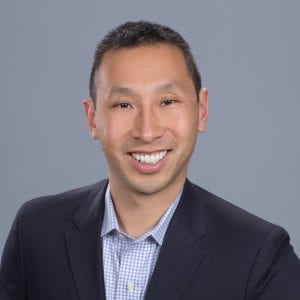
Mark Wu
Director, Harvard University Fairbank Center for Chinese Studies; Henry L. Stimson Professor, Harvard Law School
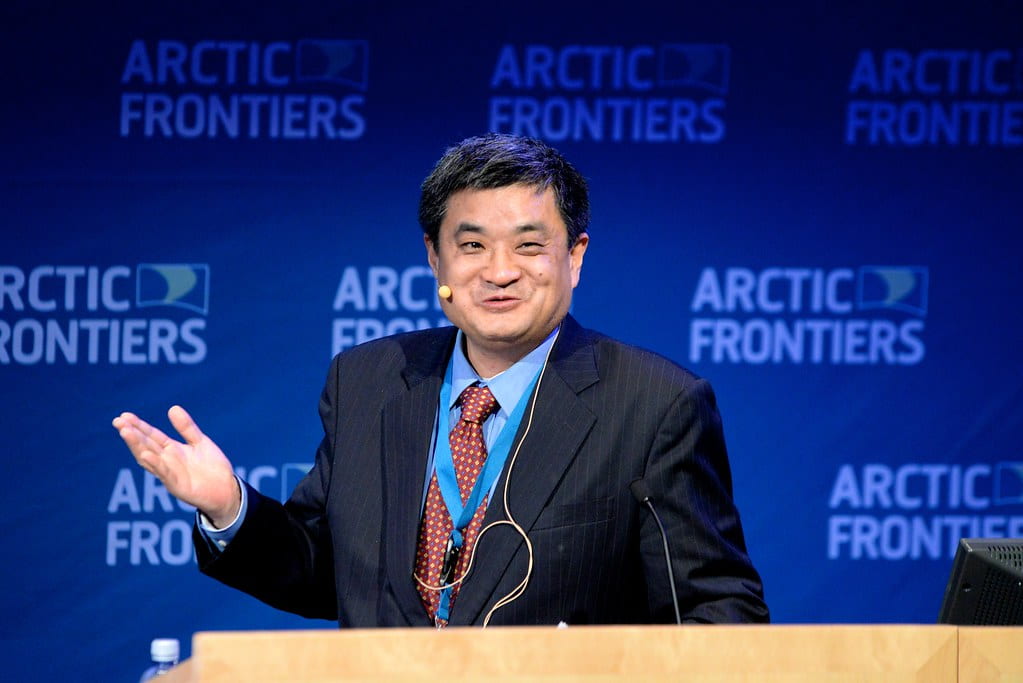
Daojiong Zha
Professor of International Political Economy, School of International Studies, Peking University

